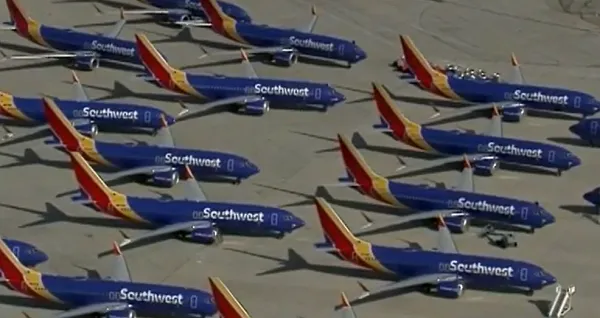
Boeing to take $US4.9 billion charge for MAX fiasco
Jul 18, 2019

Boeing is set to incur a significant charge of approximately 4.9 billion dollars related to the ongoing repercussions of the 737 MAX crisis. This financial impact stems from various factors, including legal settlements, compensation to airlines, and adjustments to production plans. The 737 MAX was grounded for nearly two years following two fatal crashes, severely damaging Boeing's reputation and financial standing. As the company continues to navigate the aftermath, this charge underscores the extensive costs associated with ensuring safety and restoring trust among customers and regulators in the aviation industry.
The aviation industry has recently faced significant challenges, with Boeing at the center of a major financial setback. The company has announced a staggering $US4.9 billion charge related to its troubled 737 MAX aircraft, a situation that has been dubbed the "MAX fiasco." This article delves into the implications of this charge, the broader impact on the aviation industry, and what it means for Boeing's future.
The Background of the 737 MAX Fiasco
The 737 MAX program has been under intense scrutiny since two fatal crashes in 2018 and 2019, which resulted in the loss of 346 lives. These tragic events led to a worldwide grounding of the aircraft and a significant loss of consumer trust. Boeing has faced legal challenges, regulatory hurdles, and a damaged reputation, all of which contributed to the decision to take this substantial financial charge.
Financial Implications for Boeing
The $US4.9 billion charge reflects the financial consequences of the ongoing issues surrounding the 737 MAX. This amount will be recorded in Boeing's financial statements as a pre-tax charge, affecting both the company’s earnings and cash flow. Analysts suggest that this charge is a necessary step for Boeing as it seeks to address ongoing liabilities and operational adjustments.
In the following table, we outline the key financial metrics that Boeing is currently grappling with:
| Financial Metric | Current Value | Previous Quarter | Change (%) |
|---|---|---|---|
| Revenue | $15.3 billion | $16.2 billion | -5.6% |
| Net Income | -$2.9 billion | -$1.4 billion | -107.1% |
| Debt | $61.6 billion | $58.5 billion | 5.3% |
| Cash Flow | -$4.1 billion | -$3.5 billion | 16.9% |
Impact on Shareholder Confidence
Shareholder confidence has been shaken due to the ongoing fallout from the MAX fiasco. The announcement of the $US4.9 billion charge is likely to further erode trust among investors. Boeing's stock price has seen significant volatility, reflecting investor concerns about the company's ability to recover from this crisis. It is essential for Boeing to demonstrate a clear path forward to regain investor confidence.
Regulatory and Legal Challenges
The legal and regulatory landscape for Boeing remains complex. The company is facing numerous lawsuits from families affected by the crashes, as well as regulatory scrutiny from aviation authorities worldwide. These challenges have not only financial implications but also affect Boeing's ability to operate effectively in the market.
In light of these challenges, Boeing has been proactive in its approach to compliance and safety. The company has implemented new safety protocols and has been working closely with regulators to ensure that the 737 MAX can return to service safely. However, the lingering effects of the MAX fiasco are expected to impact Boeing’s operations for the foreseeable future.
Future Prospects for Boeing
Despite the current challenges, Boeing remains optimistic about its future. The aviation industry is expected to rebound as global travel restrictions ease and demand for air travel increases. Boeing's leadership is focused on innovation and improving safety measures, which are crucial for regaining market share.
In the coming quarters, Boeing’s ability to manage costs, improve production efficiency, and restore trust among stakeholders will be critical. Additionally, the company must navigate the competitive landscape as rivals like Airbus continue to advance their positions in the market.
Conclusion
The $US4.9 billion charge taken by Boeing highlights the ongoing repercussions of the MAX fiasco and the significant challenges the company faces. While there are obstacles ahead, Boeing's commitment to safety and innovation may pave the way for recovery. Stakeholders will be closely monitoring the company’s financial performance and strategic initiatives in the coming months. As Boeing works to emerge from this crisis, the lessons learned will undoubtedly shape its future trajectory in the aviation industry.
Related Articles

Explore Thailand: The Best Islands to Visit for Paradise, Adventure, and Relaxation

The Ultimate Guide to the Best Islands in Thailand for Your Next Getaway

Do babies need passports? How to get a passport for a newborn

How to get a U.S. passport fast: here’s how to expedite the process

What is Mobile Passport Control: 5 reasons why you should use it

SENTRI vs. Global Entry: A detailed guide

Do you need a passport to go to the Bahamas? Let’s find out

Do you need a passport to go to Mexico? A detailed guide

Do you need a passport to go to Canada? We got the answer

Do You Need a Passport for a Cruise: An Essential Travel Guide

Booster Seat Requirements: All the Rules to Follow in Your Rental Car

What Are the World’s Most Powerful Passports, and How Does Yours Rank?

How to Take a Passport Photo at Home: A Helpful Guide

You've got to have heart! Southwest's new livery

Your opinion: Should water be free on low cost carriers?

Young women bolder than guys as solo travellers
